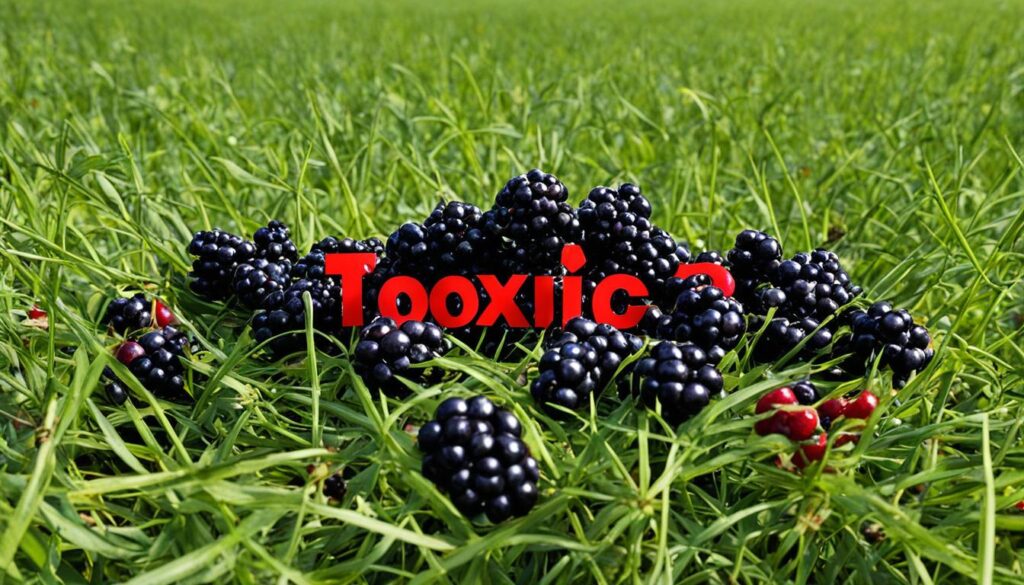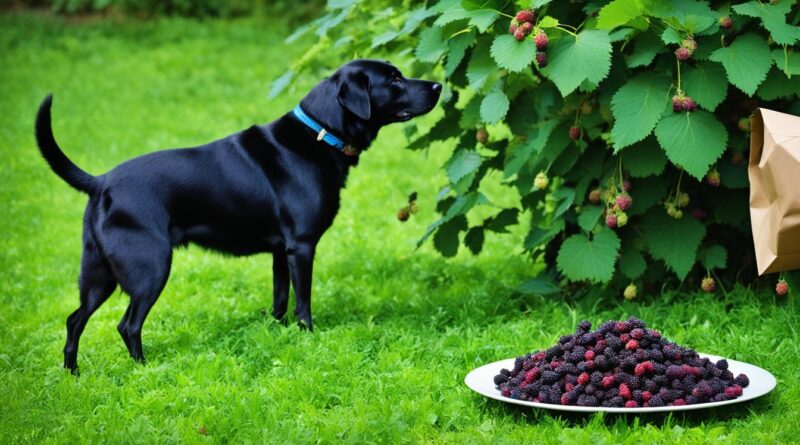Can Dogs Eat Mulberries? Find Out if Mulberries Belong in Your Dog’s Diet
Welcome to our article where we will explore whether mulberries are safe for dogs to eat. If you’ve ever wondered, “can dogs eat mulberries?” or “are mulberries safe for dogs?”, you’ve come to the right place. We’ll provide you with all the information you need to know about feeding your furry friend this delicious fruit.
Key Takeaways:
- Dogs can eat mulberries in moderation, opting for fresh ones rather than dried.
- Start with small amounts of mulberries to watch for any allergic reactions.
- Avoid feeding dogs unripe mulberries and other toxic berries.
- Mulberries offer health benefits to dogs, such as antioxidants and essential nutrients.
- Cats, being carnivores, may not show much interest in mulberries or any fruit.
Health Benefits of Mulberries for Dogs
Mulberries offer numerous health benefits for dogs, thanks to their rich nutritional profile. Packed with antioxidants, vitamins, and minerals, these delicious berries can positively impact your furry friend’s well-being.
The antioxidants found in mulberries, such as vitamin C, vitamin K, and vitamin E, play a crucial role in supporting your dog’s immune system. They help protect against free radicals, reduce oxidative stress, and lower the risk of cancer.
Aside from antioxidants, mulberries also contain essential minerals like iron and potassium. Iron aids in the production of red blood cells, promotes proper oxygen circulation, and prevents anemia. Potassium, on the other hand, supports healthy muscle function and helps maintain proper heart rhythm for your canine companion.
Mulberries are particularly beneficial for dogs in several ways:
- Lower cholesterol: The dietary fiber found in mulberries can help regulate cholesterol levels and improve your dog’s heart health.
- Stabilize blood sugar: Mulberries have a low glycemic index, meaning they do not cause a rapid spike in blood sugar levels. This makes them suitable for dogs with diabetes or those at risk of developing the condition.
- Promote bone health: Mulberries contain calcium, which is essential for maintaining strong bones and teeth in dogs. They also support skeletal structure and overall musculoskeletal health.
While dogs are generally not allergic to mulberries, it’s essential to be cautious, as any dog can develop allergies to specific foods. Start by introducing small amounts of mulberries and monitor your dog for any allergic reactions. Signs of a mulberry allergy in dogs may include itching, excessive scratching, gastrointestinal distress, or respiratory issues.
Now that you know the health benefits of mulberries for dogs, let’s take a look at how to safely incorporate these nutritious berries into your pet’s diet.

Mulberries offer a wide range of benefits, from boosting the immune system to promoting healthy bones. Remember to always introduce new foods gradually and monitor your pet for any adverse reactions.
Safe Serving Suggestions for Dogs
When serving mulberries to your dog, it’s important to do so in moderation. Too many berries can lead to digestive upset or an upset stomach.
Here are some tips on incorporating mulberries into your dog’s diet:
- Start with small amounts: Begin by offering your dog one-quarter cup of fresh mulberries at a time.
- Monitor for reactions: Observe your dog for any signs of digestive issues, allergies, or other adverse reactions.
- Limit frequency: It’s recommended to serve mulberries two or three times a week to prevent digestive problems and balance your dog’s diet.
By following these guidelines, you can ensure that your furry friend enjoys the nutritional benefits of mulberries without any negative side effects.
| Benefits of Mulberries for Dogs | How to Serve Mulberries |
|---|---|
| 1. Boosts the immune system | Start with small amounts |
| 2. Reduces oxidative stress | Monitor for reactions |
| 3. Lowers the risk of cancer | Limit frequency |
| 4. Supports bone health | |
| 5. Regulates cholesterol levels | |
| 6. Helps stabilize blood sugar |
Remember, while mulberries offer many benefits for dogs, it’s important to consult with your veterinarian before introducing any new foods into your dog’s diet, especially if your dog has pre-existing health issues or dietary restrictions.
Can Dogs Eat Other Berries?
While mulberries are a safe treat for dogs, there are several berries that can be toxic to them. It’s important to be aware of these berries and keep them away from your furry friend to ensure their well-being.
Berries Toxic to Dogs:
| Berry | Toxicity Level | Symptoms |
|---|---|---|
| Cherries | High | Vomiting, diarrhea, difficulty breathing |
| Juniper berries | Moderate | Vomiting, diarrhea, depression |
| Mistletoe berries | High | Vomiting, diarrhea, increased heart rate |
| Holly berries | High | Vomiting, diarrhea, loss of appetite |
| Baneberries | High | Vomiting, diarrhea, excessive drooling |
| Pokeberries | High | Vomiting, diarrhea, tremors, seizures |
If you suspect that your dog has consumed any toxic berries, it is crucial to seek immediate veterinary help. The symptoms of berry poisoning can vary but may include vomiting, diarrhea, seizures, loss of appetite, and drowsiness. Prompt action can potentially save your dog’s life.
“It’s important to keep your dog away from these toxic berries and only offer them safe options like mulberries.”
As a responsible pet owner, it is essential to be well-informed about which berries are safe for dogs to consume. By knowing the potential dangers and taking preventive measures, you can ensure the health and happiness of your four-legged companion.
Can Dogs Have Mulberries? – A Nutritional Perspective
Mulberries are a safe and nutritious option for dogs. They are packed with antioxidants, vitamins, and minerals that can contribute to your dog’s overall well-being. However, it’s important to remember that moderation is key. While mulberries are safe for most dogs, feeding them in excessive amounts can lead to digestive issues.
Remember:
- Stick to fresh mulberries as treats and avoid dried mulberries due to their high sugar content.
- Start with small amounts to ensure your dog’s tolerance and watch out for any adverse reactions.
- Serve mulberries in moderation, offering about one-quarter cup at a time, two or three times a week.

Ripe mulberries are not only safe for dogs to eat but also provide health benefits. However, it’s crucial to be aware of other toxic berries and ensure that your furry companion only indulges in safe options like mulberries.
Do Cats Like Mulberries?
Cats, the beloved companions of many households, have unique dietary preferences and nutritional requirements. While dogs may enjoy the occasional taste of fruit, cats, being obligate carnivores, have little interest in plant matter and lack the physical ability to taste sweetness. As such, mulberries and other fruits are not a natural part of their diet.
Unlike humans, cats lack taste receptors for sweetness due to the absence of a specific protein called TAS1R2. As a result, the sweet flavor of mulberries or any other fruit goes unnoticed by feline taste buds. Cats are highly efficient hunters and have evolved to thrive on a diet primarily consisting of meat, which provides them with the necessary nutrients for their carnivorous nature.
While some cats may show curiosity and consume small pieces of fruit out of intrigue, it is important to note that fruit is not an essential component of a cat’s diet. Offering mulberries or other fruits as occasional treats is generally safe, but it is not necessary for their overall health and well-being.
Mulberries are not toxic to cats, but if a cat consumes a large amount, it may cause digestive upset. Therefore, it’s advisable to offer fruits in moderation and ensure that they don’t make up a significant portion of your cat’s diet.

When considering your cat’s dietary needs, it’s crucial to provide them with a balanced and nutritionally complete diet that primarily consists of high-quality meat-based cat food. This type of diet ensures they receive the essential amino acids, vitamins, and minerals required for their optimal health.
Remember to consult with your veterinarian before introducing any new foods or treats to your cat’s diet to ensure they align with their specific dietary needs and overall health.
Which Fruits Are Safe for Cats?
While fruits are not a necessary part of a cat’s diet, they can be fed to cats as occasional treats in small amounts. Some fruits are safe and even provide a vitamin boost for cats. Here are some fruits that are safe for cats to consume:
- Blueberries: Rich in antioxidants, blueberries can be a healthy and tasty treat for cats.
- Bananas: Cats can enjoy small pieces of ripe banana as a source of potassium and fiber.
- Apple flesh: Cats can safely eat small amounts of apple flesh, but avoid the seeds and core.
- Berries: Strawberries, raspberries, and blackberries are safe for cats and provide antioxidants and vitamins.
- Watermelon: Cats can have small amounts of watermelon as a refreshing treat, but remove the seeds and rind.
- Cantaloupe: A small amount of cantaloupe can be a tasty and hydrating treat for cats.
These fruits can be a healthier alternative to sugary treats for cats. However, it’s important to remember that not all fruits are safe and some can be toxic to cats. Avoid feeding your cat the following fruits:
- Grapes: Grapes can cause kidney failure in cats and should be strictly avoided.
- Raisins: Similar to grapes, raisins can be toxic to cats and should not be given to them.
- Cherries: Cherries contain pits that can pose a choking hazard and should be avoided.
- Lemons: The citric acid in lemons can cause stomach upset in cats, so it’s best to steer clear of them.
- Unripe tomatoes: Unripe tomatoes, as well as the leaves and stems of the tomato plant, can be toxic to cats.
Always practice moderation when offering fruits to your cat and consult with a veterinarian if you have any concerns. Your cat’s health and safety should always be a top priority.
Conclusion
In conclusion, it is safe for dogs to enjoy mulberries as part of their diet, but in moderation. Fresh mulberries provide dogs with valuable antioxidants and essential nutrients that can support their overall health. However, it’s important to note that dried mulberries should be avoided due to their high sugar content, which can lead to digestive issues.
While dogs can enjoy the benefits of mulberries, it’s crucial to steer clear of other toxic berries that can be harmful to their health. Examples of berries that dogs should not consume include cherries, juniper berries, mistletoe berries, holly berries, baneberries, and pokeberries.
When it comes to cats, mulberries are not a natural part of their diet, and they may not show much interest in them or any other fruit. Cats are obligate carnivores, meaning their bodies require a diet primarily consisting of meat-based protein. It is essential to provide cats with a balanced diet that meets their nutritional needs.
While some cats may occasionally nibble on small pieces of fruit, it is not necessary for their well-being. If you choose to offer fruits to your cat as an occasional treat, make sure to stick to safe options such as blueberries, bananas, apple flesh, berries, watermelon, and cantaloupe. Always consult with your veterinarian before introducing any new foods to ensure they are safe for your pets.
FAQ
Can dogs eat mulberries?
Yes, dogs can eat mulberries in moderation.
Are mulberries safe for dogs?
Yes, mulberries are generally safe for dogs to eat.
Can dogs have mulberries as treats?
Yes, fresh mulberries can be served to dogs as treats.
Can dogs eat dried mulberries?
It is best to avoid feeding dogs dried mulberries due to their high sugar content.
Can dogs eat mulberry leaves?
Yes, mulberry leaves are safe for dogs to eat in small quantities.
Are dogs allergic to mulberries?
Dogs are generally not allergic to mulberries, but it’s important to start with small amounts and monitor for any adverse reactions.
How much mulberries can I give my dog?
It is recommended to offer your dog one-quarter cup of mulberries at a time, two or three times a week, to prevent digestive issues.
Can unripe mulberries be fed to dogs?
It is advisable to avoid feeding dogs unripe mulberries as they can cause stomach upset and hallucinations.
Can dogs eat other toxic berries?
Dogs should avoid consuming berries such as cherries, juniper berries, mistletoe berries, holly berries, baneberries, and pokeberries as they can be toxic.
What are the benefits of mulberries for dogs?
Mulberries are packed with antioxidants and essential nutrients like vitamin C, vitamin K, and vitamin E. They also contain minerals such as iron and potassium. The antioxidants in mulberries help improve the immune system, reduce oxidative stress, and lower the risk of cancer. Mulberries also lower cholesterol, maintain proper blood sugar levels, and promote healthy bones and skeletal structure in dogs.
Can cats eat mulberries?
Mulberries are not toxic to cats, but cats are unlikely to show much interest in them due to their carnivorous nature.
Do cats like fruit?
Cats are obligate carnivores and do not require fruit or plant matter in their diet. While some cats may eat small pieces of fruit out of curiosity, it is not a natural part of their diet.
Which fruits are safe for cats?
Cats can safely eat fruits such as blueberries, bananas, apple flesh, berries, watermelon, and cantaloupe in small amounts as occasional treats. However, grapes, raisins, cherries, lemons, and unripe tomatoes should be avoided as they can cause serious health issues in cats.


